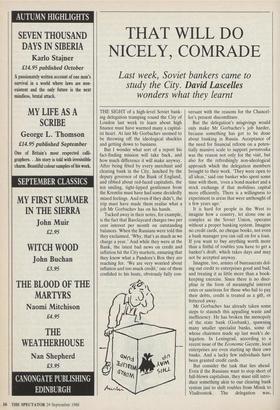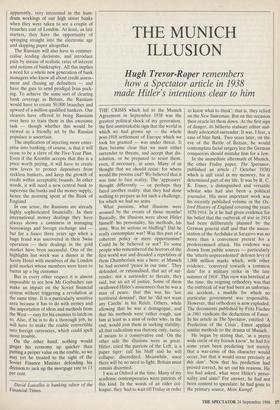THAT WILL DO NICELY, COMRADE
wonders what they learnt
THE SIGHT of a high-level Soviet bank- ing delegation tramping round the City of London last week to learn about high finance must have warmed many a capital- ist heart. At last Mr Gorbachev seemed to be throwing off the ideological shackles and getting down to business.
But I wonder what sort of a report his fact-finding mission will take back, and how much difference it will make anyway. After being feted by every merchant and clearing bank in the City, lunched by the deputy governor of the Bank of England, and ribbed about red-faced capitalists, the ten smiling, tight-lipped gentlemen from the Kremlin must have had some decidedly mixed feelings. And even if they didn't, the trip must have made them realise what a job Mr Gorbachev has on his hands.
Tucked away in their notes, for example, is the fact that Barclaycard charges two per cent interest per month on outstanding balances. When the Russians were told this they exclaimed, 'Why, that's as much as we charge a year.' And while they were at the Bank, the latest bad news on credit and inflation hit the City markets, ensuring that they know what a Pandora's Box they are reaching for. 'We are very worried about inflation and too much credit,' one of them confided to his hosts, obviously fully con- versant with the reasons for the Chancel- lor's present discomfiture.
But the delegation's misgivings would only make Mr Gorbachev's job harder, because something has got to be done about banking in Russia. Acceptance of the need for financial reform on a poten- tially massive scale to support perestroika was the reason not only for the visit, but also for the refreshingly non-ideological approach which the delegation members brought to their work. 'They were open to all ideas,' said one banker who spent some time with them, 'even a bond market and a stock exchange if that mobilises capital more efficiently. There is a willingness to experiment in areas that were unthought of a few years ago.'
It is hard for people in the West to imagine how a country, let alone one as complex as the Soviet Union, operates without a proper banking system. Imagine no credit cards, no cheque books, not even a bank manager you can call on for a loan. If you want to buy anything worth more than a fistful of roubles you have to get a banker's draft, which takes days and may not be accepted anyway.
Imagine, too, armies of bureaucrats dol- ing out credit to enterprises good and bad, and treating it as little more than a book- keeping exercise. Since there is no disci- pline in the form of meaningful interest rates or sanctions for those who fail to pay their debts, credit is treated as a gift, or frittered away.
Mr Gorbachev has already taken some steps to staunch this appalling waste and inefficiency. He has broken the monopoly of the state bank (Gosbank), spawning many smaller specialist banks, some of whose chairmen made up last week's de- legation. In Leningrad, according to a recent issue of the Economic Gazette, local enterprises are even starting up their own banks. And a lucky few individuals have been granted credit cards.
But consider the task that lies ahead. Even if the Russians want to stop short of full-blown capitalism, they must still intro- duce something akin to our clearing bank system just to shift roubles from Minsk to Vladivostok. The delegation was, apparently, very interested in the hum- drum workings of our high street banks when they were taken to see a couple of branches east of London. At least, as late starters, they have the opportunity of springing straight into the electronic age and skipping paper altogether.
The Russians will also have to commer- cialise lending decisions, and introduce pain by means of realistic rates of interest and notions of bankruptcy. All this implies a need for a whole new generation of bank managers who know all about credit assess- ment and chasing up defaulters — and have the guts to send prodigal Ivan pack- ing. To achieve the same sort of clearing bank coverage as Britain, the Russians would have to create 50,000 branches and upward of a million qualified bankers. Our clearers have offered to bring Russians over here to train them in this awesome task — though whether this would be viewed as a friendly act by the Russian populace is uncertain.
The implication of injecting more enter- prise into banking, of course, is that it will cease to be a slave of the Five-Year Plan. Even if the Kremlin accepts that this is a price worth paying, it will have to create new levers to protect depositors from reckless bankers, and keep the growth of credit within acceptable bounds. In other words, it will need a new central bank to supervise the banks and the money supply, hence the morning spent at the Bank of England.
In one sense, the Russians are already highly sophisticated financially. In their international money dealings they have always shown a canniness in managing borrowings and foreign exchange and but for a fiasco three years ago when a huge fraud was uncovered in their Swiss operation — their dealings in the gold market have been successful. One of the highlights last week was a dinner at the Savoy Hotel with members of the London gold market whose members were keen to butter up a big customer.
But in every other respect it is almost impossible to see how Mr Gorbachev can make an impact on the Soviet financial system without triggering a revolution at the same time. It is a particularly sensitive area because it has to do with money and the importation of ideas and methods from the West — easy for his enemies to latch on to. Also, if he is to do a thorough job, he will have to make the rouble convertible into foreign currencies, which could spell more trouble.
On the other hand, nothing would ginger his economy up quicker than putting a proper value on the rouble, so we may yet be treated to the sight of the Soviet Finance Minister defending his decision to jack up the mortgage rate to 13 per cent.
David Lascelles is banking editor of the Financial Times.































































 Previous page
Previous page